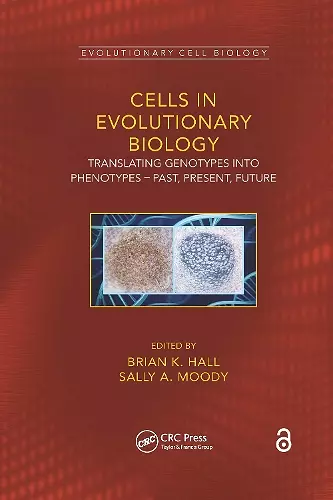Cells in Evolutionary Biology
Translating Genotypes into Phenotypes - Past, Present, Future
Brian K Hall editor Sally A Moody editor
Format:Paperback
Publisher:Taylor & Francis Ltd
Published:30th Mar '21
Currently unavailable, and unfortunately no date known when it will be back
This paperback is available in another edition too:
- Hardback£130.00(9781498787864)

This book is the first in a projected series on Evolutionary Cell Biology, the intent of which is to demonstrate the essential role of cellular mechanisms in transforming the genotype into the phenotype by transforming gene activity into evolutionary change in morphology. This book —Cells in Evolutionary Biology — evaluates the evolution of cells themselves and the role cells have been viewed to play as agents of change at other levels of biological organization. Chapters explore Darwin’s use of cells in his theory of evolution and how Weismann’s theory of the separation of germ plasm from body cells brought cells to center stage in understanding how acquired changes to cells within generations are not passed on to future generations.
Chapter 7 of this book is freely available as a downloadable Open Access PDF under a Creative Commons Attribution-Non Commercial-No Derivatives 3.0 license. https://s3-us-west-2.amazonaws.com/tandfbis/rt-files/docs/Open+Access+Chapters/9781315155968_oachapter7.pdf
"… the book is a very welcome collection of chapters that offers a good overview of the role of cells in EvoDevo. It can be recommended to anyone starting to do research in this field and should be on the bookshelf in all laboratories working in fields related to its contents. In short, a great book that taught me a lot about both subjects I thought I knew something about, and about new and exciting aspects of the role of cells in EvoDevo." Lennart Olsson. 2020. In Evolution & Development, 22.
Cells in Evolutionary Biology is the first volume in a series. It provides a valuable historical context and review not only of the cell and evolutionary biology fields, but of developmental and molecular biology as well. Readers will gain an appreciation for the history and philosophy underlying their fields, a perspective less frequently covered in the basic textbooks used in coursework. The volume includes chapters from authors specializing not only in biology and its subfields, but in culture and philosophy. It opens with the origins of cell theory and germ plasm theory, ideas that laid the groundwork for our modern understanding of evolution. It covers historical debate regarding the origin of eukaryotic cells and of multicellular organisms with differentiated tissue types. It successfully dissects topics generally accepted as fact and guides the reader through the thought process that led to that status. To appreciate this text, a solid understanding of the current science is prerequisite. As such, this extremely interesting volume is best suited to graduate level students and established researchers.
--D. Schulman, Lake Erie College
Summing Up: Recommended. Graduate students through faculty and professionals.
"… the book is a very welcome collection of chapters that offers a good overview of the role of cells in EvoDevo. It can be recommended to anyone starting to do research in this field and should be on the bookshelf in all laboratories working in fields related to its contents. In short, a great book that taught me a lot about both subjects I thought I knew something about, and about new and exciting aspects of the role of cells in EvoDevo." Lennart Olsson. 2020. In Evolution & Development, 22.
"Cells in Evolutionary Biology is the first volume in a series. It provides a valuable historical context and review not only of the cell and evolutionary biology fields, but of developmental and molecular biology as well. Readers will gain an appreciation for the history and philosophy underlying their fields, a perspective less frequently covered in the basic textbooks used in coursework. The volume includes chapters from authors specializing not only in biology and its subfields, but in culture and philosophy. It opens with the origins of cell theory and germ plasm theory, ideas that laid the groundwork for our modern understanding of evolution. It covers historical debate regarding the origin of eukaryotic cells and of multicellular organisms with differentiated tissue types. It successfully dissects topics generally accepted as fact and guides the reader through the thought process that led to that status. To appreciate this text, a solid understanding of the current science is prerequisite. As such, this extremely interesting volume is best suited to graduate level students and established researchers." --D. Schulman, Lake Erie College
Summing Up: Recommended. Graduate students through faculty and professionals.
ISBN: 9780367657239
Dimensions: unknown
Weight: 589g
280 pages